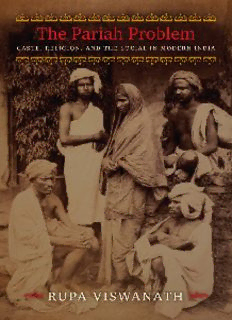
The Pariah Problem: Caste, Religion, and the Social in Modern India PDF
Preview The Pariah Problem: Caste, Religion, and the Social in Modern India
The Pariah Problem Caste, Religion, and the Social in Modem India RUPA VISWANATH Columbia University Press New York Columbia University Press Publishers Since 1893 New York Chichester, West Sussex cup.columbia.edu Copyright © 2014 Columbia University Press All rights reserved Library of Congress Cataloging-in-Publicatioo Data Viswanath, Rupa. The pariah problem: caste, religion, and the social in modern India / Rupa Viswanath. pages cm Includes bibliographical references and index. ISBN 978-0-231-16306-4 (doth : alk. paper) — ISBN 978-0-231-53750-6 (ebook) 1. Pariahs—History. 2. Pariahs—Social conditions. 3- Caste—India—History. 4. India—Sodal conditions. 5. India—History. I. Title. DS432.P25V57 2014 305.s6Mc>9S«-dc33 2013047446 © Columbia University Press books are printed on permanent and durable acid-free paper. This book is printed on paper with recycled content. Printed in the United States of America c 10 987654321 Cover Photo: © Bridgeman Art Library Cover Design: Milenda Nan Ok Lee References to websites (URLs) were accurate at the time of writing. Neither the au thor nor Columbia University Press is responsible for URLs that may have expired or changed since the manuscript was prepared. For the Dalit women, children, and men who were the targets of die official policies and unofficial strategems this book describes, and for their descendants Mitunter aber verlangt eben dasselbe Lcben, das die Vergessenheit braucht, die zeitweilige Vernichtung diescr Vergessenheit; dann soil es eben gerade klar wcrden, wie ungerecht die Existenz irgend eines Dinges, eines Privilegiums, einer Kaste, einer Dynastie zum Beispiel ist, wie sehr dieses Ding den Untergang verdient. Dann wird seine Vergangenheit kritisch betrachtet. . . . Denn da wird nun einmal die Resultate fruiterer Geschlechter sind, sind wir auch die Resultate ihrer Verimingen, Leiden- schaften und Irrthiimer, ja Verbrechen .. Sometimes this same life that requires forgetting demands a temporary destruction of this forgetfulness; it wants to be clear as to how unjust the existence of something—a privilege, a caste, a dynasty, for example—is, and how greatly this thing deserves to perish. Then its past is regarded critically. . . . Since we are the outcome of earlier generations, we are also the outcome of their aberrations, passions and errors, and indeed of their crimes ... Friedrich Nietzsche The epigraph is taken from the R. J. Holtingdale translation of Nietzsche's Untimely Meditations (ed. Daniel Breazeale, Cambridge: Cambridge University Press, 1997), 76. I have slightly altered the translation. CONTENTS PREFACE ON TERMINOLOGY 3d ACKNOWLEDGMENTS xiii ABBREVIATIONS xvii Introduction 1 Chapter 1 Land Tenure or Labor Control? The Agrarian Mise-en-Scene 23 Chapter 2 Conceptualizing Pariah Conversion: Caste, Spirit, Matter, and Penury 40 Chapters The Pariah-Missionary Alliance: Agrarian Contestation and the Local State 71 Chapter 4 The State and the Ceri 91
Description: